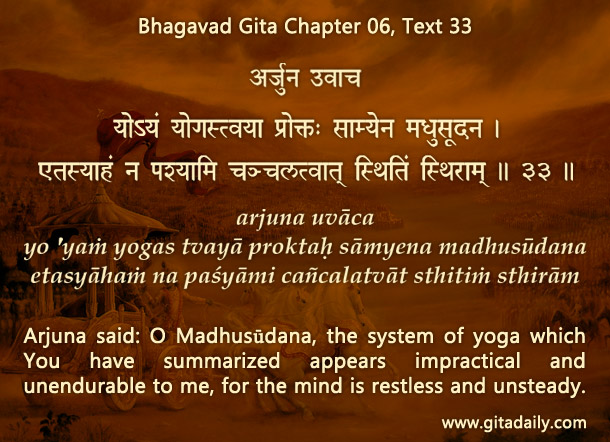In the Bhagavad-gita (6.43-44), Krishna talks about how yogis who have failed to complete their spiritual journey in one life continue it in the next. The (6.44) verse states, pūrvābhyāsena tenaiva hriyate hy avaśo ’pi saḥ—by one’s past practice, one is almost helplessly attracted toward spiritual realities. The word “avaśo” is frequently translated as “helpless,” but here it more precisely means “spontaneous.” This spontaneous attraction surges from within and without any conscious effort on the part of the individual. The attraction pulls the individual, even seemingly against their will. They may neither consciously seek nor rationally understand why they feel this attraction, but it will still be there, drawing them to the spiritual path. Thereafter, they endeavor to progress further from the point they had already attained in their previous life.
When we are struggling to focus our minds on the holy name of Krishna, such spontaneous attraction to him can seem almost like a dream—something too fantastical to be believed and simultaneously too captivating to be dismissed. If there truly exists a state where we are spontaneously drawn toward the Lord, with no struggle at all in remembering him and relishing that remembrance, why should we not strive for that? Even now, with all our struggles in trying to focus our minds on Krishna, we still experience some benefits from such remembrance. Considering that even the fragmented and forced remembrance of Krishna offers so much peace, purification, and purposefulness, we can only imagine the blessings this brings. How much greater would those blessings be if we reached the state of spontaneous attraction and absorption in him?
Thankfully, we don’t have to give up the path of bhakti in this life and then resume it in a future life to experience this spontaneous attraction. Continuing our practice consistently in this life, we will slowly but surely reach that level. This attraction, whereby the inner effort decreases substantially, leads to little or no exhaustion while chanting or remembering Krishna. The inner connection will become increasingly accessible and relishable, enabling us to feel exhilarated and ecstatic.
Summary:
- Through spiritual practice, we can all reach a state of spontaneous attraction to the Lord, where we are drawn toward him without any conscious effort, and even sometimes against our conscious will.
- Even while struggling to connect with the Lord intermittently, we still experience peace, purification, and power. Imagine how much more enriching it would be to connect with him spontaneously.
- By regularly practicing and cultivating the remembrance of Krishna, we can attain a level of attraction where remembrance is no longer exhausting but becomes exhilarating.
Think it over:
- What does the word “avaśo” signify in the context of describing the consciousness of seekers continuing their spiritual practice in a future life?
- Why might we perceive a state of spontaneous attraction to Krishna in a negative light, and how can we shift our perspective to see it more positively?
- How can we attain that state of spontaneous attraction toward Krishna?
***
06.33 Arjuna said: O Madhusūdana, the system of yoga which You have summarized appears impractical and unendurable to me, for the mind is restless and unsteady.


Leave A Comment